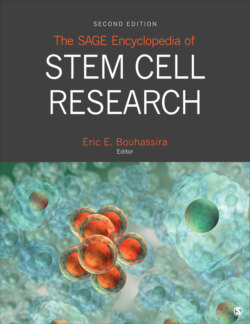Читать книгу The SAGE Encyclopedia of Stem Cell Research - Группа авторов - Страница 383
На сайте Литреса книга снята с продажи.
ОглавлениеClinical Trials, U.S.: Crohn’s Disease
Clinical Trials, U.S.: Crohn’s Disease
238
239
Clinical Trials, U.S.: Crohn’s Disease
Crohn’s disease is a chronic inflammatory disease of the gastrointestinal tract with many extra intestinal manifestations as well. It can affect any part of the digestive tract, from oral cavity to anal canal. The most common site of involvement is the small bowel, and in particular, the ileum. It usually presents with abdominal pain, diarrhea (at times bloody), weight loss, and fever. Extraintestinal manifestations include joint and skin problems.
Presented in a paper by Burrill Bernard Crohn and colleagues for the first time in 1932, the etiology of disease is not clear to date. In the United States, around 1.4 million people suffer from the disease. Many treatment regimens are emerging in an effort to find a cure to decrease the disease burden and reduce its complications. Regenerative medicine and stem cell therapy is very important, as scientists are able to understand the healing ability of the human body. This article focuses on the role of stem cell therapy in the treatment of Crohn’s disease, with emphasis on clinical trials performed in the United States.
Stem Cell Therapy
The exact etiology is not known, but involvement of the immune system, genetics, and environmental factors have been proposed. Current treatment options for Crohn’s include immunosuppressants, antibiotics, and surgery for related complications. Since conventional treatment methods are not promising, stem cell therapy has emerged to produce fruitful outcomes, with complete remission seen in recent clinical trials. In 2009, the FDA approved the first human trial using embryonic stem cells. Administration of stem cell therapies derived from adult hematopoietic, mesenchymal, and adipose tissue have been attempted. Hematopoietic stem cells produce all different blood cells, including the white blood cells that form the immune system. Because Crohn’s is caused by an exaggerated immune response, replacing the overactive immune system with a new immune system using hematopoietic stem cells could counteract this problem, but controversies still exist regarding long-term efficacy and safety. Mesenchymal stem cells are connective tissue stem cells that can generate a variety of supportive cell types and have potent immunosuppressive properties. Treatment of fistulizing Crohn’s disease with mesenchymal stem cells has shown favorable results in the latest clinical trials.
Clinical Trials in the United States
According to William Katkov, MD, methods to grow intestinal cells in lab settings have been discovered, and it is possible to generate different cell types from mature intestinal cells. In mice models, cells can patch the ulcerated lesion, thereby protecting the lesion while the intestine heals. Efficacy remains to be proven in humans.
In California, autologous hematopoietic stem cell transplantation (HSCT) for Crohn’s disease treatment was carried out to evaluate the safety and potential clinical benefits of lymphoablation followed by autologous HSCT rescue in therapy-refractive Crohn’s disease. In addition, autologous adipose tissue–derived stem cell (ASC) treatment was shown to be promising to manage fistulas, one of the complications of Crohn’s disease. A modified per-protocol analysis was devised that showed that complete fistula healing was observed in 27 of 33 patients (82%) by eight weeks after ASC injection. Of 27 patients with fistula healing, 26 patients completed additional observation study for one year and 23 patients (88%) sustained complete closure. There were no adverse events related to ASC administration. Furthermore, complete closure was well sustained. These results strongly suggest that autologous ASCs could be a novel treatment option for the Crohn’s fistula with high risk of recurrence. However, stem cell–based therapies receive criticism, as autologous transplantation reintroduces the genetically defective immune cells.
Osiris Therapeutics developed a product called Prochymal from adult bone marrow for graft-versus-host disease (GVHD) and Crohn’s disease. It is the only stem cell therapeutic currently designated by the FDA as both an Orphan Drug and Fast Track product. Phase 3 clinical trials are under way to establish the safety and diversity of Prochymal in patients with moderate to severe refractory disease.
As of December 2013, researchers at Brigham and Women’s Hospital and Massachusetts Institute of Technology were able to produce large numbers of intestinal stem cells and direct these cells to different types of mature intestinal cells. This advancement is not only a milestone in stem cell therapy, but it will also be useful for pharmaceutical companies to screen and identify new drugs.
A recent study published by Duijvestein et al. showed that the presence of mesenchymal stem cells does not hamper the immunosuppressive effects of conventional therapy. Vos et al. found that mesenchymal stem cells can turn the macrophages into the regulatory phenotype. This combined therapy is expected to promote rapid recovery and tapering of immunosuppressive therapy.
Stem cell therapy will be an important adjunct to conventional management of Crohn’s disease, but much work remains to be done.
Isma Nusrat Javed
Rawalpindi Medical College
See Also: Gut: Current Research on Isolation or Production of Therapeutic Cells; Gut: Development and Regeneration Potential; Gut: Existing or Potential Regenerative Medicine Strategies; Gut: Major Pathologies; Gut: Stem and Progenitor Cells in Adults.
Further Readings
Dalal, Jignesh, Kimberly Gandy, and Joe Domen. “Role of Mesenchymal Stem Cell Therapy in Crohn’s Disease.” Pediatric Research, v.71 (2012).
Lee, W. Y., K. J. Park, Y. B. Cho, et al. “Autologous Adipose Tissue-Derived Stem Cells Treatment Demonstrated Favorable and Sustainable Therapeutic Effect for Crohn’s Fistula.” Stem Cells, v.31/11 (2013).
Lincoff, N. “Stem Cells Used to Repair IBD Gut Damage.” HealthlineNews (October 24, 2013). http://www.healthline.com/health-news/crohns-gut-stem-cells-could-repair-ibd-damage-102413.
Medline Plus. “Clinical Trials.” http://www.nlm.nih.gov/medlineplus/clinicaltrials.html (Accessed October 2014).
